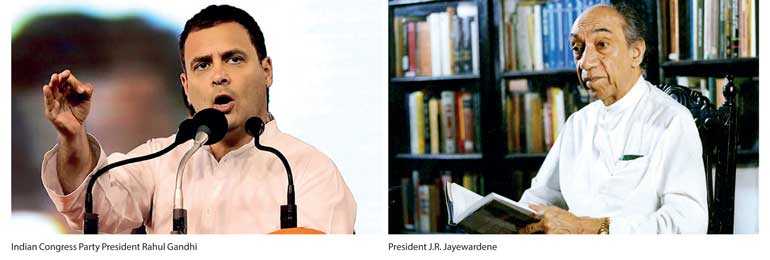Monday Feb 16, 2026
Monday Feb 16, 2026
Wednesday, 12 September 2018 00:00 - - {{hitsCtrl.values.hits}}
 By Harsha Gunasena
By Harsha Gunasena
Rahul Gandhi, President of the Congress Party, India said at the Bucerius Summer School in Hamburg, Germany on 22 August 2018 that he and his sister Priyanka Gandhi Vadra were not happy after the terror group LTTE’s chief Prabhakaran, who ordered the assassination of his father Rajiv Gandhi, was killed, as they felt “the violence inflicted upon him had impacted others, including his children”. (https://www.ndtv.com/india-news/priyanka-and-i-werent-happy-about-ltte-chief-prabhakaran-death-rahul-gandhi-1904767)
“I am talking actually from experience. The only way you can move forward after violence is forgiveness. There is no other way. And to forgive you have to understand what exactly happened and why it happened,”
“To deal with it is to actually listen and act non-violently. People think this is weakness. But in fact this is strength. My father was killed by a terrorist in 1991. In 2009, I saw the person who killed my father lying in a field in Sri Lanka.”
Rahul Gandhi also said that the only way one can fight violence is by non-violence. “There is no other way. You might be under the illusion that you can fight violence with violence, but it will come back. You might think that you are very powerful and that you can subdue somebody else, but they will find a way of coming back.”
“I called up my sister Priyanka and said that this is very strange, but I am not happy. I should be celebrating that the person who is dead is the person who killed my father. But somehow I am not happy. She said ‘you are right, I am not happy either’,” the Congress chief said. “The reason I wasn’t happy was because I saw myself in his children. So, I realised, him lying there actually means that there are kids like me who are crying,” Gandhi added.
Gandhi is not a Buddhist but he was saying exactly what Buddha said. In verse 5 of Dhammapada it was stated: “Na hi verena verani sammantidha kudacanam averena ca sammanti esa dhammo sanantano”. English translation is as follows: “Hatred is, indeed, never appeased by hatred in this world. It is appeased only by loving-kindness. This is an ancient law.”
The same sentiments were expressed by J.R. Jayewardene at the San Francisco conference on 1 September 1951 where the Japanese peace treaty was signed after World War II.
Arguing in favour of the treaty which grated freedom to Japan Jayewardene said, “We in Ceylon were fortunate that we were not invaded, but the damage caused by air raids, by the stationing of enormous armies under the South-East Asian Command, and by the slaughter – tapping of one of our main commodities, rubber, when we were the only producers of natural rubber for the Allies, entitle us to ask that the damage so caused should be repaired. We do not intend to do so, for we believe in the words of the Great Teacher whose message has ennobled the lives of countless millions in Asia, that ‘hatred ceases not by hatred, but by love’. It is the message of the Buddha, the Great Teacher, the Founder of Buddhism, which spread a wave of humanism through South Asia, Burma, Laos, Cambodia, Siam, Indonesia and Ceylon, and also northwards through the Himalayas into Tibet, China, and finally, Japan, which bound us together for hundreds of years with a common culture and heritage.” (https://talkaboutjapan.wordpress.com/truth/j-r-jayewardene/)
He concluded the speech with these words: “This treaty is as magnanimous as it is just to a defeated foe. We extend to Japan a hand of friendship, and trust that with the closing of this chapter in the history of man, the last page of which, we write today, and with the beginning of the new one, the first page together to enjoy the full dignity of human life in peace and prosperity.”
Jayewardene was not a born Buddhist. He was a Christian and converted to Buddhism later. The guardians of Buddhism of this country are nowhere as far as the sentiments expressed by Rahul Gandhi and J.R. Jayewardene.
We should ask ourselves the question, can we see issue of killing of Prabhakaran and the defeat of the LTTE in the same line of thinking of Rahul Gandhi, J.R. Jayewardene and finally the Buddha. After the defeat of the LTTE the Tamils of Sri Lanka lost all the bargaining strength to negotiate with the Centre to share the power within a unitary state. Japan was a defeated foe to the allied nations and to the world at large after the World War II. The world treated Japan well ignoring the opposition expressed by USSR but supported by Ceylon. As Rahul Gandhi said, to forgive you have to understand what exactly happened and why it happened. Did we treat Tamils after the defeat of the LTTE, the same way the world treated Japan after World War II?
Forgiveness is the beginning of reconciliation and the end of the reconciliation as well. Forgiveness is nothing but reconciliation. Reconciliation is a political decision and not a military decision. Military is there to fight a war and political leadership is there to bring peace. In Sri Lanka military has won and the political leadership up to now got defeated.
At this late stage there is still hope to change the course before Sampanthan et al got weakened politically. History should not repeat as Amirthalingam et al got weakened at the rise of militants. The country can select which way to go; the way of prosperity or the way of disparity.